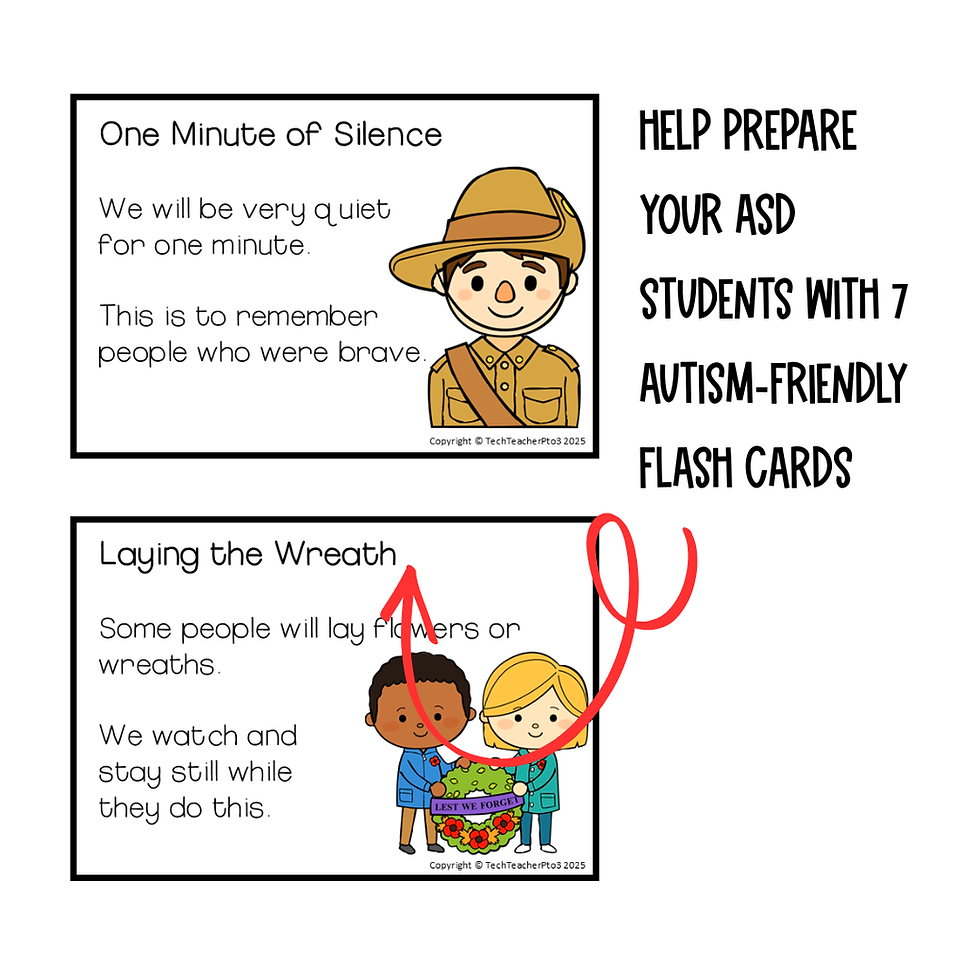First Grade Remembrance Day Literacy
- TechTeacherPto3

- Nov 1, 2025
- 2 min read
Remembrance Day is an important moment in the school year. It is a time to pause, reflect, and help our youngest learners understand the importance of honouring those who served.
For teachers of first-grade students, finding ways to introduce this solemn day with care and age-appropriate language can make all the difference.
If you are planning your lessons for the week of 11 November, here are some simple and meaningful ways to commemorate Remembrance Day with your class using our Remembrance Day Fact and Question Sheets as your foundation.
Start with a Gentle Introduction
Begin with a class discussion about what it means to remember and why people come together on Remembrance Day. Show a short, child-friendly video from one of the links in the lesson plan included in your pack to spark curiosity and conversation.
Your students can then read one of the Remembrance Day Fact Sheets, which explain key ideas such as poppies, wreaths, and ceremonies in easy-to-understand language. These are perfect for small group reading rotations or whole-class guided reading sessions.
Reinforce Learning with Question Tasks
Each fact sheet comes with a matching Question Sheet, designed with “right there” comprehension questions that guide children to find information directly from the text. These tasks help build early literacy and critical thinking skills while deepening their understanding of the topic.
The included Answer Sheets make it easy for teachers to check comprehension or support independent learners during rotations.
Explore How Other Countries Commemorate
The pack includes information about how Australia, the United Kingdom, and Canada each mark Remembrance Day. This is a lovely opportunity to build cultural awareness and highlight similarities, such as the use of poppies and moments of silence, as well as differences, like Remembrance Sunday in the UK.
Students can compare traditions using one of the writing sheets included in the pack, such as “How We Remember” or “What Happens at a Ceremony.”
Support All Learners with Visuals
The autism-friendly flashcards included in this resource are such a handy tool for helping ASD students understand what happens during a ceremony. Use these cards to preview the event before your school service so students know what to expect and feel comfortable participating.
They also make excellent visual display materials for your classroom wall or bulletin board, reinforcing key symbols like the poppy and wreath throughout the week.
Extend into English Lessons
Once students have explored the facts and watched the linked videos, transition into a writing activity using the included writing sheets.
Students might write about what Remembrance Day means to them, or describe the ceremony they attended at school.
These writing prompts link perfectly to your English learning outcomes while keeping the focus on empathy and remembrance.
Ready to Use in Your Classroom
This printable Remembrance Day pack has everything you need for a thoughtful, engaging week of HASS and English lessons:
✅ 8 Fact Sheets
✅ 8 Matching Question Sheets
✅ Answer Sheets
✅ Lesson Plan with Video Links
✅ 5 Writing Sheets
✅ 7 Autism-Friendly Flash Cards
All written in student-friendly language and perfect for First to Third Grade classrooms.
Download your no-prep Remembrance Day Fact and Question sheets here.











Comments